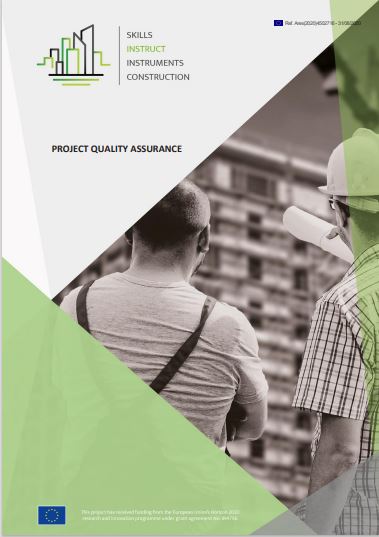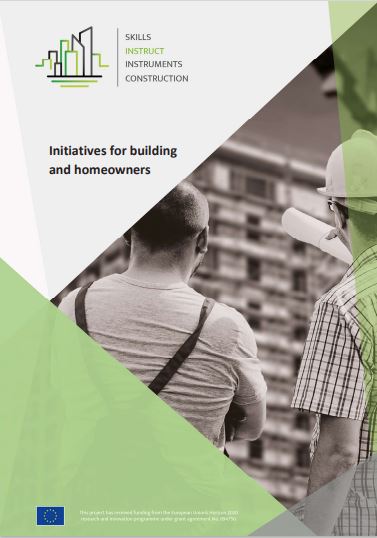 |
Proudly presenting the first results about evidencing the correlation between training and energy efficiency. Click on the picture to read more! |
 |
Know more about Data Management Plan in INSTRUCT project straight from our report. |
 |
The document provides information, rules and practices for project quality assurance in INSTRUCT project. |
 |
This report situates the need for a taxonomy in the wider landscape of upskilling initiatives in the EU, with a focus on the Member States involved in INSTRUCT: Finland, Poland, France, Luxembourg, Italy, United Kingdom and Bulgaria. In particular, it analyses the existing Skills & Qualification Frameworks used throughout EU in multiple training initiatives, including sister H2020 projects. |
 |
This document elicits the requirements for new and existing tools facilitating the mutual recognition of energy skills and qualifications in the construction sector. |
 |
The report is an output of the task devoted to monitoring of impacts and barriers and means to overcome them and provides information and practices for project impacts and barriers regarding the INSTRUCT project. This document is addressed to the INSTRUCT consortium and aims at establishing a functional flow to guarantee the maximum impact of the project. This document also supports the project management plan. |
 |
This document reports INSTRUCT demo 5 activities focused on sustainable and energy efficient construction/renovation for new and existing buildings. It was consisted of a 12 event-cycle delivered through raise awareness initiatives, training modules, conferences and seminars which took place mostly physically, but also online, from September 2021 to October 2022. |
 |
This deliverable captures and analysis results of survey amongst building and homeowners in Europe and delivers some recommendations for a quick market uptake of energy related skilled workers. It details first the homeowner classification and interests related to energy performance. |
 |
The EU-level forum for competence accreditation bodies for EE skills has been formed with the objective of enabling knowledge transfer and mutual support for the further development of qualifications, certifications and skills-demanding procurement procedures in different European countries. |
 |
This report is devoted to the task focused on increasing Energy skills certification and the demand for certification. First Energy Efficiency schemes are designed together with local cluster including FISE Finnish Certification body, Ministry of Environment, City of Tampere (building owner), Energy Authority and Finnish Association of Architects and Finnish Association of Civil Engineers. After design of EE schemes the EE schemes will be implemented in EE courses to enable certification. |
 |
This report focuses on energy skills recognition in policy-making and other issues related to the improvement of energy efficiency recommendations. It outlines the methodologies used and events performed to achieve the project’s objectives. |
 |
The objective of this report is to define the qualifications (i.e. learning outcomes) for energy efficiency informed by (a) the understanding of the correlation between training and energy efficiency, and (b) the training landscape for energy efficiency across Europe. These learning outcomes are benchmarked between the countries involved in the INSTRUCT project (France, Finland, Luxembourg, Poland, and United Kingdom), extended to other European countries using the INSTRUCT Stakeholders Network. |
 |
A framework of instruments shared amongst the project’s partners is defined. It consists in crosscutting instruments to be used and deployed across the various project activities and in particular practically applied in the demonstration pilots of INSTRUCT project. |
 |
The project team aims to identify schemes for new partnerships with key actors from the construction supply chain which would enable energy-related skills to be valorised. To do this, this deliverable reports on the identification of the value chain associated with energy efficiency in buildings, as well as the description of partnerships already put in place in various European countries with focus on the energy skills concerns. |
 |
This focuses on the efforts made by the organization to build partnerships with key stakeholders in the construction industry. The objective of the report is to demonstrate the importance of such partnerships and showcase examples of successful collaborations. The report highlights the connection between this task and other related tasks, emphasizing the organization’s commitment to sustainability and the need for collaboration across different sectors. |
 |
This deliverable gives an overview of the synergies developed between the INSTRUCT project and other H2020, national and global projects, while further details about dissemination, communication and stakeholder engagement andploitation and replication activities are already provided in other WP5 and WP6 deliverables.
This deliverable includes an overview of synergies established with other 13 H2020 EU funded projects, 3 synergies with nationally or regionally funded projects, and 2 with other global initiatives. |
 |
The need to implement this demonstration project is driven by the reported small number of trainees in energy efficiency and renewable energy related courses and professions in Bulgaria. As the initial and unofficial analysis of BUILD UP SKILLS BG2030 showed, only less than 1/3 of the 2030 targets have been achieved in the previous ten-year period. This is due to both insufficient supply of services and the delay to enact the new regulations for nearly energy- zero standard for new buildings and for increase in the minimum required energy class for renovated buildings. However, the lack of a continuing professional development system and the barriers encountered by construction companies in terms of cost and time required to deliver training remain relevant. This is why the introduction of such a Continuing Professional Development (CPD) system is considered one of the most appropriate ways to overcome them. |
 |
The present document is an output of Task 4.9. Refinement of the WP3 solutions based on the pilot results and provides information and practices for project impacts regarding the INSTRUCT project. This document is addressed to the INSTRUCT consortium and aims at establishing a functional flow to guarantee the maximum impact of the project. This document also supports the project management
plan. |
 |
The need for a demonstration initiative in Bulgaria is provoked by the formerly identified lack of institutional commitment and coordination to improve programmes and schemes for vocational training and education of construction professionals. This problem was already defined in the first phase of the BUILD UP SKILLS initiative and reflected in the resulting 2013 roadmap (BUILD UP SKILLS, Bulgaria, 2013). |
 |
The focus of INSTRUCT demo 2 is BIM Training with a particular attention on the uses of BIM for Energy Efficiency. As reported in this deliverable, this focus is to be considered broadly, with BIM often considered as a component of ‘digital tools’. Moreover, with INSTRUCT project progressing forward, the consideration for energy efficiency in the construction sector often coupled with resource efficiency (in a circular economy view). The training activities considered in demo 2 reflect this. |
 |
Legislative frameworks for enhancing energy/environmental performance of building sector are put in place all other Europe. Some of them are transposed from European regulations and some other are completely developed at regional or national level. This deliverable describes the methodology used to identify the current regulation and legislative mechanisms that will strengthen the recourse to skilled workers. The legislative landscape in Europe is not easy to figure out on a skills and trainings point of view, therefore a sorting and a listing of these mechanisms are proposed. |
 |
This report is an intermediary stage within the context of the INSTRUCT project between previous andfuture work, by using as its basis previous work and the results from the consultations (interviews, questionnaires, use cases, workshop insights). By integrating the collected data, which connects energy efficiency and training, it looks to integrate them into a digital platform that will facilitate the use of tools developed for this purpose. |
 |
This deliverable (D4.6) reports the results of INSTRUCT project task 4.6: Energy gap reduction and initiatives for building owners (North Cluster and European level). D4.6 focuses on the reduction of the gap between designed and actual energy efficiency, and initiatives for building owners. The report
concludes:
– improvements done to reduce the gap between designed and actual energy efficiency,
– additional initiatives and their success rates, based on the management and up-dating needed skills,
– concepts for building owners to adapt relevant skills verifying methods to building procurement process. |